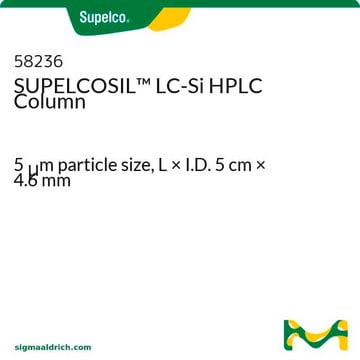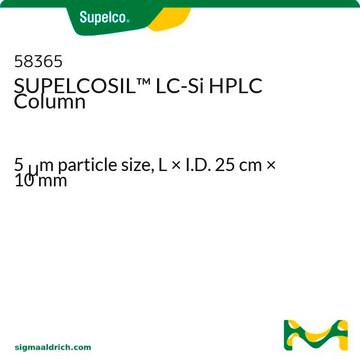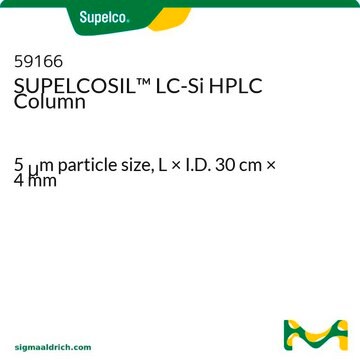58981
SUPELCOSIL™ LC-Si (3 µm) HPLC Columns
L × I.D. 15 cm × 4.6 mm, HPLC Column
Sign Into View Organizational & Contract Pricing
All Photos(1)
About This Item
UNSPSC Code:
41115700
eCl@ss:
32110501
Recommended Products
product name
SUPELCOSIL™ LC-Si HPLC Column, 3 μm particle size, L × I.D. 15 cm × 4.6 mm
Agency
suitable for USP L3
manufacturer/tradename
SUPELCOSIL™
parameter
≤70 °C temp. limit
400 bar pressure (5801 psi)
technique(s)
HPLC: suitable
L × I.D.
15 cm × 4.6 mm
surface area
170 m2/g
matrix
silica gel, spherical particle platform
matrix active group
silica phase
particle size
3 μm
pore size
120 Å pore size
pH range
2-7.5
application(s)
food and beverages
compatibility
mode of use normal phase HPLC
separation technique
hydrophilic interaction (HILIC)
normal phase
Looking for similar products? Visit Product Comparison Guide
General description
A typical mobile phase used with normal-phase silica columns consists of a hydrocarbon solvent such as hexane or heptane, mixed with a relatively small percentage of more polar solvent. Non-polar compounds will elute from the column first, while polar solutes show stronger interaction with the silanol groups on the silica surface. The polar selectivity of silica is very helpful for separating mycotoxins. Silica is frequently used in preparative chromatography due to its low operating cost and back pressure compared to reversed-phase columns. Silica is particularly popular among organic chemists as a low-pressure preparative tool. The unmodified silica in SUPELCOSIL LC-Si columns also separate positional isomers.
Legal Information
SUPELCOSIL is a trademark of Sigma-Aldrich Co. LLC
Choose from one of the most recent versions:
Already Own This Product?
Find documentation for the products that you have recently purchased in the Document Library.
J J Agren et al.
Lipids, 37(6), 613-619 (2002-07-18)
Normal-phase HPLC resolution of sn-1,2(2,3)- and x-1,3-DAG generated by partial Grignard degradation from natural TAG was carried out with both (R)-(-) and (S)-(+)-1-(1-naphthyl)ethylurethane derivatives. The diastereomeric sn-1,2- and sn-2,3-DAG derivatives were resolved using two Supelcosil LC-Si (5 microm, 25 cm
R Lovlin et al.
Journal of chromatography. B, Biomedical applications, 679(1-2), 196-198 (1996-04-26)
The stereospecific HPLC assays reported for ketoprofen (KT) mainly utilize indirect approaches. These assays involve the formation of amide diastereomeric derivatives, which are then separated by chromatography. The advantages of indirect methods include versatility, good sensitivity and cost effectiveness; however
Mohammed Shahid Ali et al.
Journal of pharmaceutical and biomedical analysis, 43(1), 158-167 (2006-08-05)
A new HILIC method has been developed for the simultaneous determination of pseudoephedrine hydrochloride (PSH), diphenhydramine hydrochloride (DPH) and dextromethorphan hydrobromide (DXH) in cough-cold syrup. Mobile phase consists of methanol:water (containing 6.0 g of ammonium acetate and 10 mL of
Our team of scientists has experience in all areas of research including Life Science, Material Science, Chemical Synthesis, Chromatography, Analytical and many others.
Contact Technical Service





